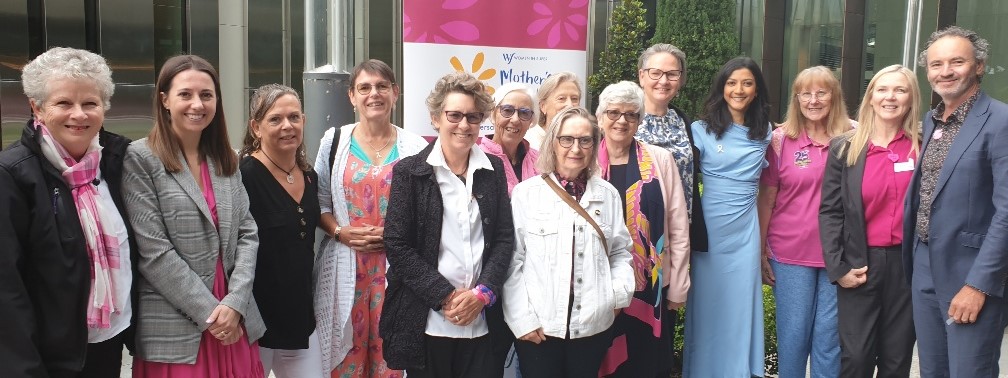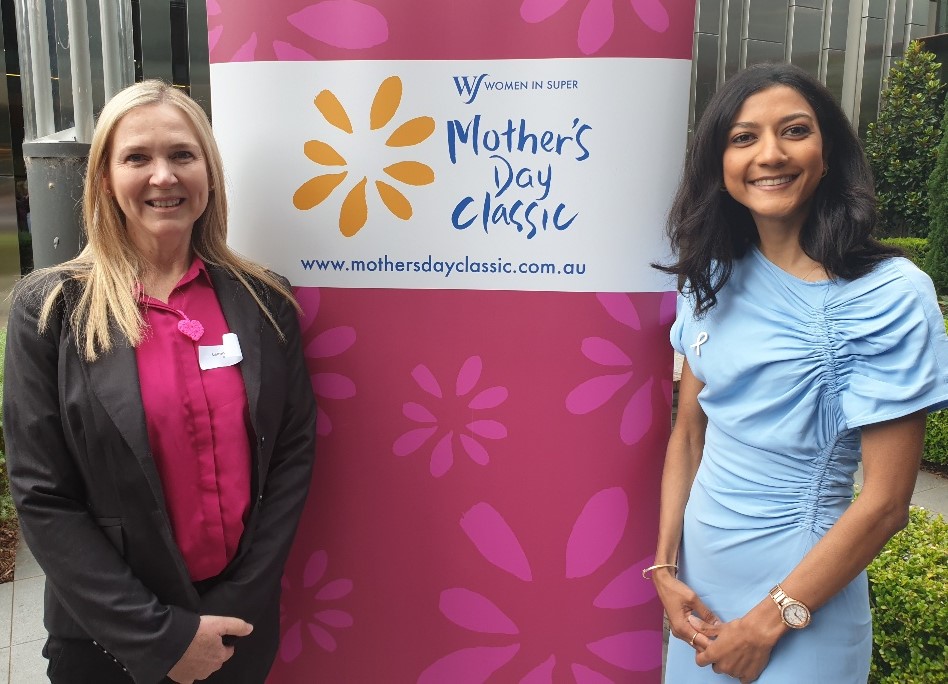Raising funds for breast cancer research since its inception in 1998, this year’s Mother’s Day Classic will for the first time give participants an option to also support ovarian cancer research.
The fresh approach was embodied at today’s MDC Canberra breakfast launch where two inspiring guest speakers shared their cancer journeys – local breast cancer survivor, Leanne Coveney, and ovarian cancer survivor, Dr Shabnam Gujadhur from Queensland.
It’s a heartwarming and generous move by MDC organisers, inspired by a desire to see ovarian cancer survival rates improve as they have for breast cancer.
MDC is partnering with both the National Breast Cancer Foundation and the Ovarian Cancer Research Foundation to fund game-changing research that is focussed on saving women’s lives.
Held in cities around Australia on Mother’s Day, this year’s MDC event in Canberra will be held at Rond Terrace on Sunday 12 May with staggered start times from 8am to 9.35am.
Over the past 26 years, the MDC community has donated $44 million to fund breast cancer research that has seen the five-year survival rate increase from 84 to 92 per cent.
However, over the past 30 years, treatment, early detection, and preventative medical research advances for ovarian cancer have been limited. Treatment options and targeted therapies have only marginally improved and there is no readily available, non-invasive early detection test for ovarian cancer. The average five-year survival rate is just 49 per cent.

Guest speaker, Dr Shabnam Gujadhur, works in medical oncology at Gold Coast University Hospital but flew to Canberra to share her story “not as a doctor but as a patient, and a woman with a lived experience with ovarian cancer.”
“Saturday 23 March will mark two years since my ovarian cancer diagnosis, at the very start of my medical career,’ she said.
“Exactly around this time two years ago, I started experiencing some very vague symptoms … I decided to put it to the side as I felt the need to keep working.
“As three weeks went by, painkillers blunted the abdominal cramps, but ongoing inter-menstrual bleeding gradually led to a growing feeling of unease,” she said.
After a close friend urged Shabnam to see a GP, an abnormal ultrasound result led to CT scans and surgery, which revealed she had ovarian cancer. She was booked for an urgent staging surgery to remove her left ovary and tube.
It then took many weeks to get a final diagnosis due to the rarity of the tumour.
In May 2022, “I was diagnosed with a stage 1 mixed germ cell tumour which was completely excised surgically,” Shabnam said.
“I subsequently opted for a non-invasive strict surveillance program for the next 10 years of my life.”
Feelings
“Like many other cancer patients, during that time I was also forced to confront mortality, perhaps at an earlier stage than I expected,” she said.
“I feared losing my future to death; I feared death would come too soon before the achievement of my dreams, the fulfilment of my purpose in life; and, above all, I feared death would deny me of precious time with my loved ones.
“However, surgical removal of my ovary and tube gave me time – time to reassess my priorities in life; time to rethink what truly matters to me; time to restart fresh; and time to love.”
Remission
“Last April, I made it past the 12 critical months with no residual tumours on my scans and I celebrated my one-year remission …
“Yet this chapter does not promise to be my last; my membership to this club is very much life-long and no one can look into my eyes and offer me the guarantee that it won’t return.
“As I slowly get used to my newfound life which revolves around monthly follow-ups with my gynae-oncologists, blood tests and scans, I constantly struggle to temper the beast itself – the fear of recurrence.
“My heart aches with sadness and grief for the loss of my pre-cancer self. On other days, I will be submerged with survivor guilt …
“The fears are limitless, but I have to remind myself every day that the best of what we are lies in what we hope to be.
“I hope to remain in complete remission.
“I hope I will be able to have a family of my own one day and I hope that generations to come will benefit from an early detection test for ovarian cancer.”
Dr Shabnam Gujadhur
Key messages and statistics
“Every time I am given the opportunity like today to speak to such a beautiful audience, I always share this saying by Vivian Green which goes ‘Life isn’t about waiting for the storm to pass. It’s about learning how to dance in the rain.’
“Throughout this harrowing journey with ovarian cancer, I found myself at a crossroads. I could either succumb to the weight of the diagnosis or harness it for a greater purpose. My decision? To dance in the rain.
“I had this fierce desire to ‘do something’.
“I wanted to break the barriers of silence that surrounds ovarian cancer.
“I wanted to transform my ordeal into a light of hope, not just for myself, but for women globally for a world free from the shadow of ovarian cancer.
“And for me that meant sharing my story, not only to help me heal and build self-acceptance but also to help others by raising awareness about ovarian cancer, the most lethal gynaecological cancer affecting women and girls of various ages.
“This year alone, more than 1,800 Australians will be diagnosed with ovarian cancer.
“Whilst I am extremely grateful for being given a choice in my treatment, not every woman has the same opportunity since 70 per cent of them are diagnosed in the advanced stages. And this is due to the vague and non-specific symptoms (unexplained weight changes, vague abdominal pain/pressure, bloating, bowel or bladder changes, abnormal vaginal bleeding), and lack of an early detection test.
“Many of these women with advanced stages of ovarian cancer will face the harsh truths about having limited treatment options or even going through lines of chemotherapy without any success.
“Heartbreaking, the prognosis for advance stages is grim, with only around 29 per cent of women diagnosed with advanced stages expected to survive beyond five years.
“I feel sick knowing it was just based on luck I was diagnosed, and it absolutely should not come down to luck.
“Every woman and girl deserves an early detection test. A pap smear does not detect ovarian cancer.
“We need to change this depressing picture of the reality of ovarian cancer.
“To date, substantial community attention and increased funding for other gynaecological cancers such as breast cancer and cervical cancer has led to the development of the mammogram and cervical screening test, resulting in over 90 per cent survivability rates.
“The only way we can do the same to increase survival rates of ovarian cancer is through funding of innovative research to find an early detection test and effective treatment for ovarian cancer.
“With the support from people like you and ongoing community collaboration, together we can massively improve the outlook for women everywhere.
“This year, we have taken one step forward in achieving this through the exciting new collaboration between Ovarian Cancer Research Foundation and Mother’s Day Classic which will aim to inspire and bring our community together, raising awareness and funds for both breast cancer and ovarian cancer research this Mother’s Day.”
Canberra Daily is keen to hear from you about a story idea in the Canberra and surrounding region. Click here to submit a news tip.



